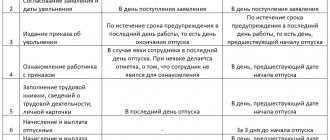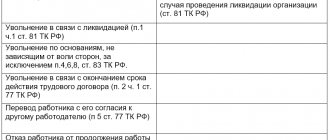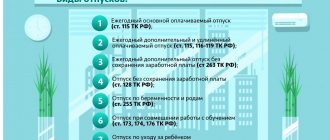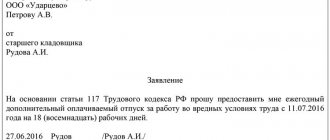An employee of an enterprise can get sick at any time - during work and during vacation, and each time he is paid differently. Calculations of payments for temporary disability are always calculated on an individual basis, depending on the average salary, the time of sick leave, the number of sick days in the current billing period, the type of sick leave, and so on. Let's find out by what rules sick leave is issued and paid during vacation followed by dismissal.
An employee gets sick on vacation: should he pay sick leave?
“By expressing a desire to receive leave followed by dismissal, the employee thereby expressed a desire to terminate the employment relationship with the employer (if dismissed at his own request) or agreed with the legality of their termination (if dismissed for other reasons).”
This means that the rule about extending vacation for sick days does not apply in this case.
However, despite the fact that leave in such a situation is not extended, sick leave taken during the period of leave followed by dismissal must be paid in any case. Moreover, you need to pay for all days of incapacity for work, regardless of when the sick leave ends (Art.
127 Labor Code of the Russian Federation, art. 5 of the Law of December 29, 2006 No. 255-FZ, Information from the Social Insurance Fund of July 21, 2015).
The judges also agree with these conclusions (Determination of the Supreme Court of the Russian Federation dated November 23, 2015 No. 34-KG15-13).
How to write an application correctly?
You need to know how to write a resignation letter correctly. It is usually drawn up by hand on an A4 sheet. However, some companies provide forms where you only need to enter the necessary information.
All of them have the same legal force and are considered the basis for drawing up a dismissal order. Without it, the company cannot fire an employee at his request, as this would be a violation of current laws. In this case, the statement must be attached to the financial report.
Sample at your own request
An application for voluntary resignation looks like this:
- in the upper right corner the name of the company and its director;
- Below is the full name and position of the employee;
- in the center you need to write the word “Statement”;
- the text itself, which should look something like this: “I request that you provide me with annual paid leave from April 1, 2021 to April 14, 2021, followed by dismissal.”
At the end there is a date and signature.
Before going on vacation, you need to make sure that the manager has signed the application. In some cases, it makes sense to draw up two statements, one of which remains with the employee. The authorized person who accepted the first copy makes a corresponding mark on it.
A sample application for leave with subsequent dismissal at your own request is possible.
Example by agreement of the parties
In this case, the statement should be the same, but the text will be slightly different. You will need to write something like this: “I request you to dismiss me by agreement of the parties as of April 24, 2021,” and at the end put a date and signature. When dismissal by agreement of the parties, the employee is often released from working hours, which is why there is no word about vacation in the text above. However, this can be included if the question is of a fundamental nature.
Dear readers! To solve your problem right now, get a free consultation
— contact the duty lawyer in the online chat on the right or call: +7 Moscow and region.
+7 St. Petersburg and region. 8 Other regions of the Russian Federation You will not need to waste your time and nerves
- an experienced lawyer will take care of all your problems!
What if you extend your vacation?
Some employers believe that in this situation the employment contract is valid until the end of the vacation, since annual leave in the presence of sick leave is extended by the number of days of illness (Part 1 of Article 124 of the Labor Code).
At the same time, if the employer has already made a record of dismissal in the work book before the start of the vacation, corrections are made in it, and compensation is also calculated for unused vacation days in connection with the recalculation of insurance and days of work under the employment contract.
But with this approach, labor disputes are not excluded, since it is impossible to unilaterally extend the employment relationship with an employee: the employer thereby violates the employee’s right to freedom of work (Article 37 of the Constitution of the Russian Federation).
A way out of the situation may be to obtain the employee’s written consent to extend the vacation and postpone the dismissal to a later date.
Is the vacation period extended in this case?
The notice of dismissal records the day on which the parties terminate their employment relationship. This is the last day of vacation.
The date is indicated in the documents. Cash payments and transfer of the work book are made before going on vacation (this procedure is approved by the letter of the Federal Service for Labor and Employment dated December 24, 2007 No. 5277-6-1). Therefore it is not extended.
On our website there are other useful publications on the topic of dismissal and sick leave that will help employers competently carry out this procedure. From them you will learn:
- Deadlines for paying personal income tax on sick leave, and is payment for a sick leave included in the list of compensation upon dismissal?
- How to correctly issue a certificate for calculating sick leave?
- What to do if an employee, after writing a letter of resignation, goes on sick leave?
Let's sum it up
- Temporary disability benefits are paid to the employee who submitted the sick leave in full. Even if the employee was sick during his vacation with subsequent dismissal.
- As for extending the leave of a resigning employee, it is safer to follow the recommendations of Rostrud, that is, not to extend the leave for days on sick leave.
Vacation followed by dismissal is an option that benefits both the company and employees. The organization saves on wages, and the employee does not interrupt his work experience and does not make excuses for “gaps” at the next interview.
Expert opinion
Gusev Pavel Petrovich
Lawyer with 8 years of experience. Specialization: family law. Has experience in defense in court.
Sick leave received while on vacation is taken into account by the employer. But what should a sick employee count on if the application has already been signed and the company is not interested in it?
Dear readers! Our articles talk about typical ways to resolve legal issues, but each case is unique.
Is the newsletter paid for?
If an injury or illness occurs on vacation (when the contract has not yet been terminated), they will fall under the insured event and will be paid in full. If an insured event occurs after dismissal, but 30 days have not passed since the termination of the contract, the employee has the right to sick leave compensation after dismissal under Part.
2 tbsp. 5 of Law No. 255-FZ (who pays sick leave for a former employee and where to apply for payments if more than 30 days have passed since dismissal, we told here).
But only if the sick leave is in his name and at the time of his illness he had not found a job. The first 3 sick days are paid by the employer, starting from the 4th - from the Social Insurance Fund budget.
We tell you more about the conditions and procedure for paying sick leave to a former employee after dismissal in a separate article, and you can find out what to do if the former employer refuses to make the payment here.
How to transfer a document to an employer, when can this be done?
The Labor Code of the Russian Federation does not regulate the procedure for transferring sick leave. Closed sick leave must be provided to the accounting department or human resources department. If you cannot give it in person, you should send it by registered mail - the fact of receipt of the letter will be recorded by the postal service.
The maximum period regulated by the state is 6 months after restoration of functionality. This period can be extended if there is a valid reason for the delay.
- hurricanes, floods, fires and other emergencies;
- disability for more than 6 months;
- moving to another locality;
- death of a loved one;
We discuss in a separate article how long after dismissal you can submit documents to your former employer for sick leave and when the corresponding payments must be made.
How to calculate payment for sick leave?
The payment depends on several indicators:
- The coefficient of work experience accumulated by the employee (from 8 years - 1; 5-8 years - 0.8; from 6 months to 5 years - 0.6).
- The duration of the illness indicated on the sick leave certificate.
- The employee’s average daily earnings for the 2 calendar years preceding the illness (consists of wages, bonuses, all types of additional payments and compensation provided in money, goods or services; payment for housing, vouchers and other income from the organization). Average earnings are divided by 730.
Example:
Average daily earnings are calculated using the formula:
Compensation based on length of service will be:
968 rub. x 0.6 x 7 = 4065 rub. 60 kopecks
Of these, the employer will pay for 3 days (1,742 rubles 40 kopecks), and the rest will be paid by the Social Insurance Fund.
If sick leave is opened within 1 calendar month after termination of the contract, 60% of average earnings will be paid. Experience is not taken into account.
If there is no data on average earnings, it is calculated according to the current minimum wage.
Within what period is the employer required to transfer the money?
Art. 140 of the Labor Code in part 1 obliges the resigning employee to be paid on the last day of the contract. If the sick leave is closed, then the day written in the work book will become the calculated day. Otherwise, the calculation will be provided when the quitter applies for payment or the next day after that.
Article 140 of the Labor Code of the Russian Federation. Payment terms upon dismissal
Upon termination of the employment contract, payment of all amounts due to the employee from the employer is made on the day the employee is dismissed. If the employee did not work on the day of dismissal, then the corresponding amounts must be paid no later than the next day after the dismissed employee submits a request for payment.
In the event of a dispute about the amount of amounts due to the employee upon dismissal, the employer is obliged to pay the amount not disputed by him within the period specified in this article.
Can an employer refuse and what to do in this case?
The employer can compensate sick leave in full, in part, or refuse. Only partially when:
- the injury was sustained under the influence of drugs or alcohol;
- the patient did not come for examination at the appointed time;
- violated the hospital regime, about which a corresponding note was made on the sheet.
The employer has the right to refuse if:
- the sick leave certificate is fake or closed in a different institution than the one that issued it;
- deadlines for provision were missed without good reason;
- the injury was intentionally caused by the employee himself;
- the employee is under administrative or criminal arrest.
If an employer refuses to pay sick leave, he violates the Labor Code of the Russian Federation and falls under administrative liability. The employee should contact the labor inspectorate of the area or the court.
An employee who performed his work duties without complaints and was registered in accordance with the Labor Code of the Russian Federation may qualify for sick leave pay during vacation with subsequent dismissal. The procedure for providing payment is determined by law and differs from the sequence of processing compensation provided for by law in other cases.
Didn't find the answer to your question? Find out how to solve exactly your problem - call right now:
An employee of an enterprise can get sick at any time - during work and during vacation, and each time he is paid differently. Calculations of payments for temporary disability are always calculated on an individual basis, depending on the average salary, the time of sick leave, the number of sick days in the current billing period, the type of sick leave, and so on.
Let's find out by what rules sick leave is issued and paid during vacation followed by dismissal.
- What are the features of sick leave during vacation followed by dismissal?
- An example of how sick leave is issued during vacation followed by dismissal
- How is sick leave processed during vacation followed by dismissal?
- How is sick leave paid during vacation followed by dismissal?
- Legislative acts on the topic
- Common mistakes
- Answers to common questions about sick leave during vacation followed by dismissal
Rules and exceptions
The employer is obliged to pay sick leave to its employees, subject to the latter providing certificates of incapacity for work. Federal legislation establishes the size of the benefit and the conditions for its payment in the Federal Law of December 29, 2006 No. 255-FZ “On compulsory social insurance in case of temporary disability and in connection with maternity.”
Article 2 of Law No. 255-FZ defines the category of persons covered by compulsory social insurance, who are paid temporary disability benefits upon the occurrence of an insured event. These include Russians who carry out their activities in accordance with the Labor Code of the Russian Federation on the basis of a concluded employment contract.
According to Part 2 of Article 5 of Law No. 255-FZ, on a certificate of incapacity for work, benefits are paid during work under an employment contract, performance of an official assignment or activity during which employees are subject to compulsory social insurance in case of temporary disability, as well as in cases where the disease occurred during within 30 calendar days from the date of termination of the contract, completion of work or activity.
Let’s assume that an employee fell ill after he had taken a vacation and was subsequently fired. In this case, the employer must count 30 calendar days from the day the former employee’s vacation ended. And if 30 days have not passed, then he must be paid a benefit in the amount of 60 percent of average earnings.
Consequently, the legislator obliges businessmen to pay sick leave to a dismissed employee of the organization. In this case, the procedure for calculating the benefit will depend on who it is paid to: an employee or a former employee.
In accordance with Part 1 of Article 14 of Law No. 255-FZ, temporary disability benefits are calculated on the basis of average earnings for two calendar years, which must be divided by 730 (Part 3 of Article 14 of Law No. 255-FZ). According to Part 1 of Article 7 of Law No. 255-FZ, the amount of payment directly depends on the length of insurance coverage at the time of illness, and the longer the length of service, the higher the coefficient: less than 5 years of experience in the company - a coefficient of 0.6 is applied; from 5 to 8 years – coefficient 0.8; with 8 or more years of experience - coefficient 1.
At the same time, the benefit to the former employee must be calculated and paid in the amount of 60 percent of average earnings. The duration of the insurance period is not taken into account (Part 2 of Article 7 of Law No. 255-FZ). Do not forget that the benefit in this case is paid within 30 calendar days from the date of termination of the employment contract.
The main question remains: from what point should this period be counted?
According to Article 84.1 of the Labor Code of the Russian Federation, an employment contract is terminated on the employee’s last working day, except in cases where the person being dismissed did not actually work on that day, but his position and workplace were retained. Upon written application of the employee, he may be granted leave with subsequent dismissal. In this case, the day of termination of the employment relationship will be the last day of vacation. The validity of this approach was confirmed by the Supreme Court in its ruling dated November 23, 2015 No. 34-KG15-13. The Supreme Court of the Russian Federation indicated: if a specialist fell ill during leave granted to him with subsequent dismissal, then his incapacity for work occurred before the termination of his employment relationship, since the day of his dismissal is the last day of leave. According to the Supreme Court arbitrators, benefits must be calculated taking into account the employee’s length of service and applying the appropriate coefficient.
I will briefly tell you about the case in which the Supreme Court came to the above conclusion. The employee was granted leave followed by dismissal from July 21 to September 23. During this period, she was injured and sought specialized help at a medical institution, where she was issued a certificate of incapacity for work, dated August 23, that is, the date fell while she was on vacation. The employee provided a certificate of incapacity for work, but never received the money. The employer justified his refusal by the fact that 30 calendar days had already passed since the last working day. However, the RF Armed Forces decided otherwise. The servants of Themis came to the conclusion that the employer’s opinion “is erroneous, based on incorrect interpretation and application of substantive law governing disputed relations.” They pointed out that the company was wrong in believing that the 30-day period during which an employee is entitled to receive benefits should be counted from the day preceding the first day of vacation followed by dismissal. The employer in court referred to the ruling of the Constitutional Court of the Russian Federation dated January 25, 2007 No. 131-О-О. However, this did not help him. The fact is that this document contains explanations in which cases an employee can withdraw a letter of resignation while on vacation with subsequent dismissal, but it does not address the issues of providing temporary disability benefits during this period. The court satisfied the plaintiff’s demands, since she proved that she had the right to receive benefits since her incapacity for work occurred while she was in an employment relationship with the defendant. And the company from which the employee has actually already quit will have to pay for her sick leave.
Now let’s look at the example of calculating sick leave.
What are the features of sick leave during vacation followed by dismissal?
Expert opinion
Gusev Pavel Petrovich
Lawyer with 8 years of experience. Specialization: family law. Has experience in defense in court.
Sick leave during vacation followed by dismissal is not a typical situation, and therefore it differs in some features associated with the following points:
- the date of issue of the order to dismiss the employee;
- the employee’s right to leave;
- carrying out the transfer of dismissal;
- the procedure for calculating payments to a dismissed employee.
The head of the company must simultaneously issue 2 orders in relation to one of his subordinates:
- order to grant the employee leave (form No. T-6);
- order to dismiss an employee (Form No. T-8).
The date of dismissal of the employee and the last day of his vacation should not coincide.
If an employee is fired for violating the labor discipline of the enterprise, he does not have the right to leave, after which he could have been fired. If there is a certificate of incapacity for work, then leaving work will be dated on the first working day after leaving sick leave.
If an employee takes sick leave when the manager has already issued a dismissal order, the dates relating to leave and dismissal should not be changed.
If an employee loses his job immediately after he goes on vacation, the money he earned and his work record must be transferred immediately, without waiting for the end of the vacation.
Vacation followed by dismissal is provided at the discretion of the employer - the law does not oblige to satisfy the employee’s request.
There is also the opposite situation, when an employee managed to rest, taking advantage of part and full period of annual leave, but did not work these days - then leave not only cannot be granted, but overpaid vacation pay is also withheld from the employee’s salary in the amount of no more than 20% of the amount. salary
Is it possible to get sick leave before a vacation with dismissal?
In accordance with the norms of current legislation, absolutely any employee is given the full right to draw up a letter of resignation while on sick leave or even after it. When he returns from this leave, he can also inform the employer of his intention by submitting the appropriate application paper.
If there are certain causal factors that give the right to act this way and not attend detention, they must be indicated in the document.
The final verdict is made by the employer, who subsequently makes a decision regarding a specific employee, based on the prevailing circumstances. There are several legally provided situations in which an employee may be dismissed due to the employer’s initiative:
- a specialist is subject to direct reduction in numbers or staff;
- failure to complete the established probationary period;
- liquidation of an enterprise voluntarily or compulsorily;
- violation by an employee of his immediate official duties;
- observation by the employer of the fact that the employee was periodically observed violating labor discipline standards;
- showing up at work while intoxicated, absenteeism;
- lack of compliance by the employee with the position held.
Regardless of the severity of the offense committed by the employee, the employer does not have the right to make a decision on unconditional dismissal when the employee is on vacation or sick.
Even if an employee, having information about the upcoming dismissal, deliberately takes a sick leave on the eve of this date, the law still provides his support. And while the sheet is in effect, the employer does not have the right to fire him. We will allow such an act only from the moment the employee returns from sick leave.
In practice, there is a category of unscrupulous workers who take out six such leaves over several months in order to continue the process of calculating wages and extending their seniority.
If this lasts a long time and there is a trial, the fiscal authority has the right to regard this act as an abuse of the employee’s right and admit that the employer is right in wanting to formalize the dismissal as quickly as possible.
An example of how sick leave is issued during vacation followed by dismissal
Let's imagine the situation. Secretary Petrov I.I.
submits an application for annual leave and dismissal of her own free will immediately after the rest. The manager agrees, the personnel department employees and the accounting department draw up documents according to which the due funds (last salary and vacation pay) will be paid on the last working day - October 29, 2016.
After registration of the dismissal, Petrova issued a sick leave, in which the date of onset of the illness is November 21, 2016, and the closing date of the sick leave is December 6, 2017.
When registering sick leave during the vacation period, the dismissal documents are not subject to change. The leave, although it is the main one, is not extended due to the period of incapacity for work, since the subordinate is fired.
Since Petrova managed to bring sick leave within the first month after the date of dismissal, she should be compensated for it. The post-dismissal benefit is paid in the amount of 60% of average earnings for the last 2 years, regardless of the length of insurance coverage.
An employee cannot receive 2 payments at the same time, since sick leave is paid from November 29, 2016 - from the date of dismissal.
Vacation may be issued to an employee who resigns immediately upon its completion, and the dismissal order must be dated from the final day of vacation. Thus, the last day of work is not the day of dismissal, but the penultimate day of vacation.
Vacation cannot be extended due to sick leave. Petrova’s vacation was paid for from November 1, 2016 to November 28, 2016.
From November 29, 2016, she began to receive money for sick leave for 3 days – November 29, 30 and 31, 2016.
This money will be transferred from the employer's funds. Further, all sick days are compensated from the Social Insurance Fund budget in the amount of 60% of average earnings.
Design features
If an employee takes leave before dismissal and falls ill, there is no need to extend his leave. But the employer is obliged to pay sick leave. Let’s imagine Marina applies for annual leave and voluntary resignation after a vacation.
The HR department draws up the necessary documents and issues an order in free form for granting leave with subsequent dismissal, or issues two orders - one for leave, the other for dismissal.
Accounting calculates payments to the dismissed person - salary, bonuses, various allowances (if any) and vacation pay. After that, the HR department records the dismissal in the work book and closes the employee’s personal card. Marina receives all the documents, a full payment, goes on vacation and gets sick.
When applying for sick leave during legal holidays, the dismissal documents cannot be changed. And the vacation itself is not extended due to temporary disability, since the employee is fired.
To receive temporary disability benefits, Marina needs to come to her former employer with sick leave after recovery. She should be given an appropriate payment.
The certificate of incapacity for work itself on leave taken before dismissal is drawn up according to the general rules: in a medical institution, on a special form or in electronic form. At the same time, the employer must pay it in full, because Marina’s last working day is the last day of vacation.
Long-term illness
When a person is sick for more than 15 days, it is considered a long-term illness. Doctors can extend the same sick leave, or they can write out several certificates of incapacity for work, sending the patient to a hospital or sanatorium.
Each organization will issue a separate certificate of incapacity for work . It happens that the old certificate of incapacity for work was closed, and a new one was opened the next day (Chapter 9 of Order No. 624-N of the Ministry of Social Development and Health). In these cases, it is important that sick leave be issued consecutively and continue each other.
Then the period of incapacity for work will be considered one insured event. This period will be paid according to the standard: the first three days - at the expense of the employer, the remaining days - at the expense of the Social Insurance Fund. If sick leave certificates are issued consecutively, but they do not continue each other, these are considered different insurance events. For example, if Marina first got a sore throat and then broke her arm.
In each of them, the first three days are paid by the employer, the rest by the Social Insurance Fund. The procedure for paying sick leave is defined in Article 3 No. 255-FZ “On compulsory social insurance in case of temporary disability and in connection with maternity,” which enshrines all these rules.
For more information on how to apply for continued sick leave after dismissal, read this material.
How is sick leave paid during vacation followed by dismissal?
It doesn’t matter for what reason an employee is fired, sick leave must be compensated in any case.
The actions of an employee who wishes to receive payment for a certificate of incapacity for work are as follows:
- bring the head of the enterprise a sick leave certificate (issued within a month after dismissal, no later) within six months from the date of dismissal;
- demand payment of benefits for sick leave issued due to illness, poisoning, injury to the employee himself, as well as the need to care for a sick family member (not if the sick leave was issued after dismissal);
- demand sick leave benefits calculated according to the minimum wage (7,800 rubles from July 1, 2021), if there is no data on average earnings for the past 2 years.
Common mistakes
Error: An employee demands an extension of his main leave with subsequent dismissal for the period of time that he spent on sick leave.
Comment: In general, annual leave should be extended by the number of days indicated on the sick leave issued during the rest period. But not in the case of vacation followed by dismissal - in such a situation the vacation is not extended.
Error: An employee is going to complain to the Labor Inspectorate about an employer who refused to provide him with leave followed by dismissal.
Comment: Providing leave, after which the employee immediately leaves work, is not the responsibility of the employer, so he is guided by the current state of affairs at the enterprise.
Answers to common questions about sick leave during vacation followed by dismissal
Question No. 1: Will I be paid for sick leave if I took it out during my main vacation followed by dismissal?
Answer: Yes, a certificate of incapacity for work provided to the employer within a month from the date of dismissal is subject to compensation in the amount of 60% of the average income for the 2 years preceding the insured event.
Question No. 2: I was fired for repeated violations of labor discipline, can I request leave with subsequent dismissal?
Answer: No, in such a situation the employee is not entitled to leave.
While on annual paid leave, an employee may experience a period of temporary incapacity due to his illness. In this case, in order to pay compensation, an officially employed citizen must provide the employer with a certificate from the medical institution.
A special situation is in which it is issued while on vacation with subsequent dismissal.
- What to do if you get sick?
- Will the holiday be extended?
- Is it possible to pay for sick leave?
- conclusions
Sick leave during regular vacation
The right to paid leave is guaranteed by labor legislation.
It is understood that the employee spends this time on rest and the implementation of some plans that are difficult to implement at other times. However, the disease makes significant adjustments: in fact, malaise deprives a person of the opportunity to fully rest. Therefore, the law makes it possible to increase leave for the time that a person was unwell. This fact must be confirmed by a certificate of incapacity for work, which will also be paid. Important! The Labor Code obliges the employer, in the event of temporary disability, to extend the next vacation or, in agreement with the employee, to transfer it to another period (Article 124 of the Labor Code of the Russian Federation). This rule applies to both basic leave and additional days of paid rest provided to certain categories of workers.
Therefore, if an illness overtakes a person during vacation, his actions are no different from usual: he goes to the doctor and draws up a sick leave. There are no restrictions in law as to how much vacation can be covered by illness. Therefore, even if an employee gets sick the day after going on vacation and remains ill until it ends, he is required to extend his vacation for the entire period of illness and pay sick leave. When calculating the days for which vacation is extended, non-working holidays are not taken into account.
Sick leave during vacation is paid in the same way as regular sick leave.
What to do if you get sick?
If an employee goes on vacation with further dismissal, then there is no turning back, his work activity is over in the company. In normal times, the disability would be paid and the vacation extended. What to do if illness occurs while on vacation and subsequent termination of the employment contract?
Important! The first thing you need to do if you fall ill is to notify your immediate supervisor by presenting a sick leave certificate.
Registration of leave and dismissal involves the preparation by the employee of 2 relevant documents:
- requesting leave;
- requesting subsequent dismissal.
Based on statements of this type, responsible employees draw up vacation orders with subsequent dismissal. In this case, the dismissal order indicates the date of termination of the contract - the last day of vacation. The settlement amount and work book must be issued to the employee immediately on the pre-vacation day.
If exact dates are noted in the order, and the employee issues a sick leave while on vacation, changes to the document are not allowed. That is why it is important to report illness and provide sick leave at your place of work as early as possible.
Will the holiday be extended?
In accordance with the general rule from Art. 124 of the Labor Code of the Russian Federation, leave during which an employee falls ill is increased by the number of days indicated on the certificate of incapacity for work.
It is important to note that this rule does not apply to the rest period, at the end of which the employee will be dismissed.
Previously, this statement was ambiguous, because the Labor Code of the Russian Federation does not have clear information on this matter.
This issue was resolved after the Ministry of Labor published a letter, following the study of which it was concluded that when taking out sick leave while on vacation followed by dismissal, there is no need to extend it.
That is, no changes are made to the documents, the vacation is not extended, and the date of termination of the employment relationship is not postponed.
conclusions
If an employee goes on vacation with subsequent dismissal, then the fact of illness and sick leave during this period does not extend the rest period or postpone its end date. There is also no recalculation of vacation pay.
However, the employee has the right to receive disability benefits; for this, he needs to present a sick leave certificate at his place of work. It is important to note that all days of the sheet are subject to payment.
This is due to the fact that in most cases the last day of employment is considered the final day of vacation. Consequently, an illness occurring during this period is considered an insured event.
In accordance with the current legislation of the Russian Federation, payment for the period of incapacity for work can be made even if it occurs after the end of the employment agreement - within 30 days.











